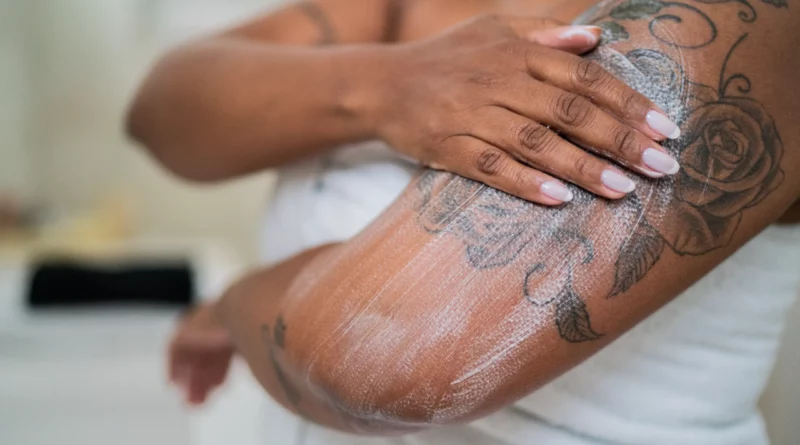How to Care for Your Tattoo during the Seasons: Summer vs Winter
Tattoos are a form of self-expression that require proper care and maintenance to keep them looking vibrant and healthy. Whether you’re a tattoo enthusiast or just got your first tattoo, understanding how to care for it during different seasons is crucial. Seasonal changes, especially between summer and winter, can significantly impact the health and longevity of your tattoo. In this article, we will explore the essential aspects of tattoo care during the seasons and provide valuable tips to ensure your tattoo stays in top shape all year round. We will also introduce a reliable tattoo care product called Bitchin Butter that can enhance your tattoo care routine.
Tattoos have become increasingly popular as a way to express one’s personality and commemorate significant life events. However, many people overlook the importance of proper tattoo care, especially during different seasons. In this article, we will delve into the topic of caring for tattoos during summer and winter, focusing on the unique challenges each season presents and offering practical solutions to maintain the beauty and integrity of your ink.
Understanding Tattoo Care
Before we dive into the specifics of seasonal tattoo care, it’s essential to have a basic understanding of general tattoo care principles. Proper tattoo care begins immediately after getting inked and continues for the rest of your tattoo’s life. Some crucial aspects of tattoo care include keeping the tattoo clean, moisturized, protected from the sun, and avoiding excessive scratching. By following these basic guidelines, you can minimize the risk of infection, fading, and other complications.
Importance of Seasonal Tattoo Care
Seasonal changes, particularly between summer and winter, bring about significant variations in weather conditions, temperature, and humidity. These changes can have a profound impact on your tattoo’s appearance and overall health. Neglecting seasonal tattoo care can lead to issues such as sunburn, dryness, cracking, and premature fading. By adapting your tattoo care routine to the specific requirements of each season, you can preserve the vibrancy and longevity of your ink.
Caring for Your Tattoo in Summer
Summer is a time of increased sun exposure, higher temperatures, and more outdoor activities. These factors can pose unique challenges for your tattoo’s well-being. Here are some essential tips to care for your tattoo during the summer months:
Protecting Your Tattoo from the Sun
Excessive sun exposure can cause your tattoo to fade and lose its clarity over time. To protect your tattoo, always apply a high SPF sunscreen to the inked area before going outside. Look for sunscreens specifically formulated for tattoos, as they provide better protection and prevent sunburn. Additionally, consider wearing loose clothing or using a sun-protective film to shield your tattoo from direct sunlight.
Hydrating Your Tattoo in Hot Weather
Hot weather and increased sweating can lead to dryness and dehydration of your tattooed skin. Make sure to keep your body well-hydrated by drinking plenty of water. Additionally, moisturize your tattooed area with a tattoo-specific aftercare product like Bitchin Butter. This will help prevent dryness, maintain the tattoo’s colors, and promote faster healing.
Avoiding Chlorine and Saltwater
While swimming can be refreshing during the summer, both chlorine and saltwater can have detrimental effects on your tattoo. Chlorine can cause irritation and fading, while saltwater can lead to excessive dryness and cracking. If you plan to swim, ensure you cover your tattoo with a waterproof barrier or use a specialized tattoo sealant. After swimming, rinse the tattoo with clean water and gently pat it dry.
Caring for Your Tattoo in Winter
Winter brings colder temperatures and lower humidity levels, creating a harsh environment for your tattooed skin. Here are some essential tips to care for your tattoo during the winter months:
Moisturizing Your Tattoo in Dry Conditions
The dry air of winter can cause your skin to become dehydrated, leading to itchiness and flaking. It’s crucial to moisturize your tattooed area regularly using a tattoo-specific moisturizer like Bitchin Butter. Apply the moisturizer after showering or washing your tattoo, as this helps lock in moisture and prevent dryness.
Shielding Your Tattoo from Cold Weather
Extreme cold weather can be particularly harsh on your tattooed skin. Protect your tattoo by wearing warm clothing that covers the inked area. If your tattoo is on an exposed body part, consider using a breathable but protective tattoo wrap or bandage to shield it from cold winds and freezing temperatures.
Avoiding Overheated Indoor Environments
During winter, indoor environments tend to be heated, which can lead to dryness and discomfort for your tattoo. To maintain proper moisture levels, use a humidifier in your living space. This will help prevent excessive drying of your tattooed skin and preserve its overall health.
General Tattoo Care Tips
In addition to seasonal care, there are some general tattoo care tips that apply throughout the year. These tips will help ensure the long-term vibrancy and health of your tattoo:
Keeping Your Tattoo Clean
Maintaining cleanliness is essential for tattoo care. Wash your tattoo gently with a mild, fragrance-free soap and warm water. Avoid using harsh soaps or scrubbing the tattoo vigorously, as this can damage the ink and irritate the skin. Pat the tattoo dry with a clean towel or let it air dry.
Avoiding Excessive Scratching
As your tattoo heals, it may become itchy. However, resist the temptation to scratch or pick at the scabs, as this can disrupt the healing process and potentially lead to infection or scarring. Instead, lightly tap or moisturize the itchy area to alleviate the discomfort.
Choosing the Right Tattoo Aftercare Products
Selecting the appropriate aftercare products for your tattoo is crucial. Look for products specifically formulated for tattoo care, such as Bitchin Butter. These products are designed to nourish and protect your tattoo, promoting faster healing and preserving its colors.
Conclusion
Caring for your tattoo during different seasons is essential to maintain its vibrant appearance and ensure its longevity. By following the tips outlined in this article, you can adapt your tattoo care routine to the unique challenges of summer and winter. Remember to protect your tattoo from the sun, moisturize regularly, and avoid harsh conditions that can affect its health. Incorporating high-quality tattoo care products like Bitchin Butter can enhance the effectiveness of your care routine. With proper care, your tattoo will continue to be a beautiful and meaningful form of self-expression for years to come.
Tattoo Care FAQ’s
1. Can I use regular moisturizers on my tattoo?
Regular moisturizers may not provide the specific nourishment and protection required for tattooed skin. It’s best to use tattoo-specific moisturizers formulated to meet the unique needs of tattoos, such as Bitchin Butter.
2. How often should I apply sunscreen to my tattoo?
To protect your tattoo from sun damage, apply sunscreen with a high SPF value every two hours or more frequently if you’re swimming or sweating. Reapplication is crucial, especially during prolonged sun exposure.
3. Can I go tanning with a fresh tattoo?
It’s highly recommended to avoid tanning beds and prolonged sun exposure until your tattoo is fully healed. Tanning can cause fading, irritation, and potentially compromise the healing process.
4. Can I swim in a pool or the ocean with a new tattoo?
It’s best to avoid swimming in pools or the ocean until your tattoo has fully healed. Both chlorine and saltwater can have adverse effects on the healing process and the appearance of your tattoo.
5. How long does it take for a tattoo to heal completely?
The healing process varies for each individual and depends on factors such as tattoo size, location, and personal health. Generally, it takes about 2-4 weeks for the initial healing, but complete healing and settling of the ink can take several months.




